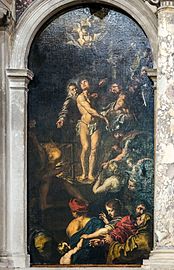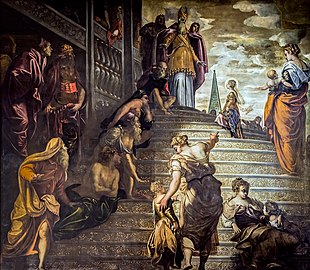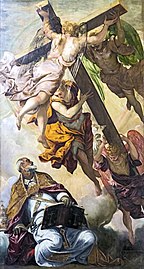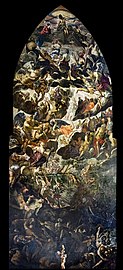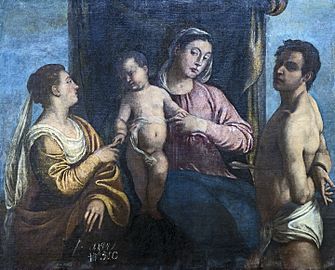Madonna dell'Orto
| Madonna dell'Orto | |
|---|---|
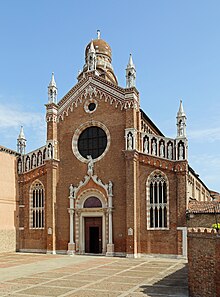 Madonna dell'Orto. | |
| Religion | |
| Affiliation | Roman Catholic |
| Province | Venice |
| Location | |
| Location | Venice, Italy |
| Geographic coordinates | 45°26′46.81″N 12°19′56.9″E / 45.4463361°N 12.332472°E |


The Madonna dell'Orto is a church in Venice, Italy, in the sestiere of Cannaregio.
History
The church was erected by the now-defunct religious order the "Humiliati" in the mid-14th century, under the direction of Tiberio da Parma, who is buried in the interior. It was initially dedicated to St. Christopher, patron saint of travellers, but its popular name suggesting consecration to Holy Virgin comes from the following century, when an allegedly miraculous statue of the Madonna, commissioned for the Church of S. Maria Formosa but rejected, was brought to the Church from the nearby orchard (orto in Italian) where it had languished.
The church lay on weak foundations and in 1399 a restoration project was financed by the city's Maggior Consiglio. The Humiliati, due to their "depraved customs", were ousted in 1462 and the Madonna dell'Orto was assigned to the congregation of Canons Regular of San Giorgio in Alga. The latter order was suppressed in 1668, and the following year the Church and convent annexed were handed over to Cistercians of Lombardy. In 1787 the church came under public administration. Restoration was begun under Austrian rule in the 1840s and finished in 1869, by which time Venice had become part of the unified Kingdom of Italy.
Façade
The façade, built in 1460–1464, has sloping sides and is in brickwork, divided in three parts by two pilasters strips. The two side sections have quadruple mullioned windows, while the central has a large rose window. The portal is surmounted by a pointed arch with white stone decorations portraying, on the summit, St. Christopher, the Madonna and the Archangel Gabriel by Nicolò di Giovanni Fiorentino and Antonio Rizzo. Under is a tympanum, in porphyry, supported by circular pilaster strips. The whole is included into a porch with Corinthian columns.
The upper central section is decorated by small arches and bas-reliefs with geometrical motifs. The upper sides have instead twelve niches each, containing statues of the Apostles. Five other Gothic niches are in the central section, with 18th-century statues representing Prudence, Charity, Faith, Hope and Temperance, taken from the demolished church of Santo Stefano.
Interior
The interior has a nave and two aisles, with double-framed pointed arches supported by Greek marble columns. The transept is absent, while in the rear is a pentagonal apse decorated by paintings by Jacopo Robusti, known as Tintoretto, who is buried here. The organ over the entrance was built in 1878, and is one of the most powerful in Venice.
At an altar to the south/right of the main entrance is St. John Baptist and Saints by Cima da Conegliano, and in the fourth chapel on the North/left facing the main altar, the Contarini Chapel, there is a notable St. Agnes by Tintoretto. The Renaissance Valier Chapel once housed a small Madonna with Child by Giovanni Bellini (1481), stolen in 1993. Other works by Tintoretto in the church include a Presentation in the Temple (South aisle, close to the East end), Adoration of the Golden Calf, Last Judgement (both in the apse, either side of the main altar) and the Four Cardinal Virtues (in the upper storey of the apse, behind the altar), all from 1562 to 1564.
-
Interior of the church.
-
The organ over the entrance.
-
Baptismal Fonts.
Right Nave
- Sculpture of Madonna with Child, attributed to Antonio Rizzo
- Altarpiece of St John Baptist with Saints Peter, Mark, Jerome, and Paul, by Cima da Conegliano.
- St Christopher Martyr, copy of original by Cima da Conegliano[2]
- Altar of Immaculate conception: built in 1593 to accommodate miraculous statue now in Cappella San Mauro
- Monument to Gerolamo Cavazza by Giuseppe Sardi (1624–1699)
- Martrydom of St Lorenzo by Daniel van den Dyck.
- Presentation of Virgin at Temple (1550–1553), Tintoretto.
-
Madonna with Child, by Antonio Rizzo
-
St John Baptist with Saints Peter, Mark, Jerome, and Paul
-
Altarpiece of St Christopher
-
Altar of Immaculate conception
-
Monument to Gerolamo Cavazza
-
Martyrdom of St. Lawrence, by Daniel van den Dyck
-
Presentation of Virgin at Temple Tintoretto
St Mauro Chapel:
- St Leonardo Murialdo (1983) Ernani Costantini
- Miraculous Madonna, Giovanni De Santi, 14th century
- Pieta, copy of work by Savoldo[3]
- Madonna with Child and St Mauro abbott, Antonio Molinari.
-
St Mauro Chapel
-
Statue of Madonna dell'Orto
-
Madonna with Child and St Mauro abbott, Antonio Molinari
-
Pieta by Savoldo (1480–1548)
-
Pietro Acotanto
-
Francesco Querini
-
Antonio Pizzamano
-
Niccolò Giustinian
-
The Blessed Illuminata Bembo
Sacristy
- Canvas with Madonna with Child and Saints attributed to school of Paris Bourdon
Apse Chapel Right
- Tomb of Tintoretto, bust by Napoleone Martinuzzi
- Saints Augustine and Jerome, Girolamo Santacroce
-
St. Jerome and St. Augustine by Girolamo da Santacroce
-
Tomb of Tintoretto
Choir
- The Last Judgement (1563, right), Tintoretto
- Idolatry of Golden Calf (1563, left), Tintoretto
- St. Peter’s Vision of the Cross (1550–1553) Left, Tintoretto.
- Above: Cardinal virtues: Justice and Temperance, half-dome of apse: Decollation of St Paul (1550–1553), right side of apse, Tintoretto
- Above: Cardinal virtues: Prudence and Strength, Tintoretto
- Annunciation (1590), Jacopo Palma il Giovane, from church of Santa Maria Nuova of Vicenza
- Above: Faith, Pietro Ricchi
-
Choir
-
Idolatry of Golden Calf Tintoretto
-
St. Peter’s Vision of the Cross by Tintoretto
-
Annunciation (1590), Jacopo Palma il Giovane
-
The Last Judgment Tintoretto
-
The beheading of St. Paul by Tintoretto
-
The faith by Pietro Ricchi
Left of main Nave
- St Lorenzo Giustiniani and Saints, altarpiece copy of Il Pordenone original.
- St George and the Dragon by Matteo Ponzone
- Flagellation of Christ, Matteo Ponzone
- God the Father in Glory (c. 1590) Domenico Tintoretto
- Mystic marriage of Saint Catherine of Alexandria, School of Titian
-
St Lorenzo Giustiniani and Saints
-
St George and the Dragon by Matteo Ponzone
-
Flagellation of Christ by Matteo Ponzone
-
God the Father in Glory by Tintoretto
-
Mystic marriage of Saint Catherine of Alexandria
Contarini Chapel:
- Miracle of St Agnes (1575), Tintoretto
- Funereal Monument of Contarini Family
-
Contarini Chapel
-
Carlo di Alvise Contarini (1636-1688)
-
Gasparo Contarini (1483-1542)
-
Alvise Contarini (1521-1579)
-
The miracle of Saint Agnes Tintoretto
-
Alvise Contarini (1597-1651)
-
Tommaso Contarini (1488-1578) by Alessandro Vittoria
-
Tommaso Contarini (1562-1614)
Morosini Chapel:
- The Nativity and Saint Dominic Domenico Tintoretto
- Angels bearing incense, Domenico Tintoretto
- Crucifixion, Jacopo Palma il Giovane from church of St Ternita
-
Chapel Morosini
-
Crucifixion Palma il Giovane
-
Angels bearing incense, Domenico Tintoretto
-
The Nativity and Saint Dominic Domenico Tintoretto
-
Angels bearing incense, Domenico Tintoretto
Vendramin Chapel:
- Arcangel Raphael and Tobias (1530) Titian, now in sacristy of San Marziale
- Painting of St Vincent with saints Domenic, Lorenzo Giustiniani, Elena and Pope Eugenius IV by Jacopo Palma the Elder. Figures of Saint Helena and St Domenic inserted during restoration in 1867 by Placido Fabris
-
Vendramin Chapel
-
Arcangel Raphael and Tobias by Titien
-
St Vincent with saints Domenic, Lorenzo Giustiniani, Elena and Pope Eugenius IV by Jacopo Palma the Elder
-
Cristo morto accolto dal Padre Bartolomeo Litterini
Valier Chapel:
- Madonna with Child (1480) Giovanni Bellini (stolen 1993).
-
Chapel Valier
-
Madonna with Child (1480) Giovanni Bellini
Bell tower
The bell tower, in brickwork, was finished in 1503. It has a square plan, with pilasters strips on the sides leading to the cell with circular mullioned windows. Four semicircular tympani divided the cell from the upper cylindrical tambour with an onion dome in Eastern style.
-
The bell tower
-
The bell tower
On the sides are four statues of Evangelists of Pietro Lombardo's school; on the summit is a statue of the Redeemer, in white marble. The old bells, the largest being from 1424, were replaced in 1883.
References
- ^ details derived from Italian Wikipedia entry
- ^ OriginalSt Christopher Martyr by Cima (1480–1548) now in Gallerie dell'Accademia
- ^ Original Pieta by Savoldo (1480–1548) now in Vienna
External links
- Interior of the church (in English)
- Madonna dell'Orto parish website (in Italian)
- Churches of Venice
- Roman Catholic churches completed in 1464
- Roman Catholic churches completed in 1503
- Roman Catholic churches in Venice
- 14th-century Roman Catholic church buildings in Italy
- 15th-century Roman Catholic church buildings in Italy
- Towers completed in the 16th century
- Gothic architecture in Venice
- Venetian Gothic architecture











